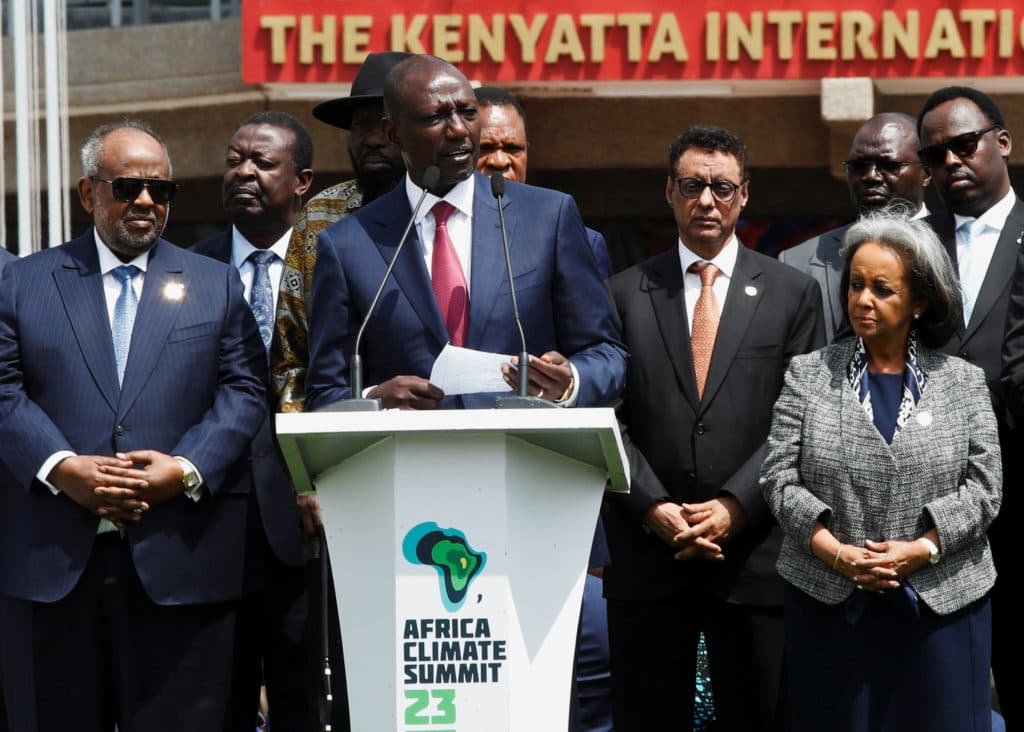We're loading the full news article for you. This includes the article content, images, author information, and related articles.
Nairobi, Kenya – President William Ruto has criticised what he terms the unfair global climate financing system, stating that it has left Africa struggling under the weight of debt despite its contribution to the climate crisis being the least.

Nairobi, Kenya — September 22, 2025, 20:15 EAT.
President William Ruto has criticised what he calls an “unfair and broken” global climate finance system, accusing it of imposing crushing debt burdens on African nations despite the continent’s minimal role in the climate crisis.
Speaking at a High-Level Solutions Dialogue on Climate Finance on the sidelines of the 80th United Nations General Assembly (UNGA) in New York on Monday, September 22, President Ruto argued that the current financing architecture forces African governments to borrow heavily for climate adaptation and mitigation, even though Africa contributes less than 4% of global greenhouse gas emissions.
“Global climate financing is unfair, forcing Africa to raise most of its resources at home and placing an impossible burden on economies that have contributed the least to this crisis,” Ruto said.
The Kenyan leader’s remarks come amid rising calls from African Union member states for restructured debt terms and direct access to climate funds managed by institutions like the Green Climate Fund (GCF) and the Global Environment Facility (GEF).
Africa’s double burden: While grappling with droughts, floods, and desertification, many African nations spend up to 10% of GDP on climate adaptation—often financed through costly loans.
Previous pledges: Developed nations promised $100 billion annually in climate finance at COP15 in Copenhagen (2009) and reaffirmed this at COP21 in Paris (2015), but delivery has fallen short, with most funds coming as loans rather than grants.
Debt vs. climate goals: Kenya alone spends over 50% of annual revenue on debt servicing, leaving little fiscal space for green investments.
Paris Agreement (2015): Article 9 obligates developed nations to provide climate finance to developing countries for mitigation and adaptation.
African Common Position on Climate Finance: Adopted at the African Ministerial Conference on the Environment (AMCEN) 2023, calls for grant-based financing and debt relief mechanisms.
UNFCCC COP Process: Climate finance rules negotiated under the UN Climate Convention remain central to global talks, with Africa pushing for reforms at COP30 in Brazil.
President William Ruto: “Africa cannot be forced to borrow for a crisis it did not create. Climate finance must be accessible, predictable, and just,” he told delegates in New York.
UN Climate Envoy Selwin Hart: Backed Ruto’s call, noting that “the current system disadvantages vulnerable economies already facing historic injustices.”
African Development Bank (AfDB) President Akinwumi Adesina: Recently stated that Africa needs $2.7 trillion by 2030 for climate adaptation and clean energy transitions.
$100bn Pledge Gap: OECD data shows only $83.3 billion was delivered in 2022, much of it as loans.
Debt Stress: 22 African countries are either in debt distress or at high risk, per the IMF (2025).
Kenya’s Reality: Climate disasters cost Kenya an estimated 2–3% of GDP annually, according to the National Treasury’s 2024 Climate Budget Report.
Economic: Rising debt costs could derail infrastructure and social spending across Africa.
Geopolitical: Calls for climate justice may strain relations between the Global North and South ahead of COP30.
Environmental: Delayed financing risks worsening climate impacts, including food insecurity and displacement.
Whether the US and EU will back Africa’s push for grant-based finance at upcoming COP negotiations.
If new global carbon tax proposals will include direct adaptation funding for least-developed countries.
How China, now Africa’s largest creditor, will respond to calls for debt–climate swaps.
2009: $100bn climate finance pledge made in Copenhagen.
2015: Paris Agreement commits developed nations to climate finance obligations.
2023: Nairobi Declaration calls for global financial reforms at the Africa Climate Summit.
Sept 22, 2025: Ruto addresses UNGA High-Level Dialogue on Climate Finance.
COP30 in Brazil: Will the Loss and Damage Fund become fully operational?
World Bank/IMF Meetings (Oct 2025): Debt–climate swap proposals expected on the agenda.
Kenya’s Green Energy Bonds: Treasury to issue climate-linked sovereign bonds in 2026.
Editor’s Note: This story will be updated as official responses from developed nations and multilateral lenders emerge in the coming days.
Keep the conversation in one place—threads here stay linked to the story and in the forums.
Sign in to start a discussion
Start a conversation about this story and keep it linked here.
Other hot threads
E-sports and Gaming Community in Kenya
Active 9 months ago
The Role of Technology in Modern Agriculture (AgriTech)
Active 9 months ago
Popular Recreational Activities Across Counties
Active 9 months ago
Investing in Youth Sports Development Programs
Active 9 months ago